Good morning! In the last catecheses we spoke about the family that lives the frailties of the human condition: poverty, sickness, death. Today, instead, we reflect on the wounds that are opened in fact within the family’s coexistence. When, that is, harm is done in the family itself — a most awful thing!
We are well aware that no moments are lacking in any family history in which the intimacy of dearest affections is offended by the behavior of its members. Words and actions (and omissions!) that, instead of expressing love, subtract or, even worse still, mortify it. When these wounds, which are still remediable, are neglected, they worsen: they are transformed into arrogance, hostility, contempt. And at a certain point they can become profound lacerations, which divide husband and wife, and induce to seeking understanding, support and consolation elsewhere. However, often these “supports” do not think of the good of the family.
The deprivation of conjugal love spreads resentment in relations, and often the break-up falls on the children.
See, the children. I would like to reflect somewhat on this point. Notwithstanding our seemingly evolved sensibility, and all our refined psychological analyses, I wonder if we are not also anesthetized in regard to the wounds of children’s soul. The more one tries to compensate with presents and little snacks, all the more the sense is lost of the most painful and profound wounds of the soul. We talk a lot about behavioral disturbances, psychic health, the child’s well-being, of anxiety of parents and children … but do we yet know what a wound of the soul is? Do we feel the weight of the mountain that crushes the soul of a child, in families in which there is bad treatment and harm is done, to the point of breaking the bond of conjugal fidelity? In our choices — mistaken choices, for example — how much weight does the soul of the children have? When adults lose their head, when each one thinks only of him/herself, when father and mother harm one another, the soul of the child suffers much, he experiences a sense of desperation. And they are wounds that leave their mark for the whole of life.
Everything is connected together in the family: when its spirit is wounded in some point, the infection contaminates everyone. And when a man and a woman, who committed themselves to be “one flesh” and to form a family, think obsessively of their own needs of freedom and gratification, this distortion profoundly damages the heart and life of the children. So many times children hide to cry by themselves. We must understand this well. Husband and wife are one flesh, but their children are flesh of their flesh. If we think of the harshness with which Jesus admonishes adults not to scandalize the little ones — we heard the passage of the Gospel — (cf. Matthew 18:6), we can also understand better his word on the grave responsibility to protect the conjugal bond that begins the human family (cf. Matthew 19:6-9). When man and woman have become one flesh, all the wounds and all the abandonments of the father and the mother affect the living flesh of the children.
On the other hand, it is true that there are cases in which separation is inevitable. Sometimes it can even become morally necessary, when in fact it is a question of removing the weaker spouse, or little children, from the gravest wounds caused by arrogance and violence, humiliation and exploitation, estrangement and indifference.
Not lacking, thank God, are those that, sustained by faith and love of the children, witnesses their fidelity to a bond in which they believed, although it seems impossible to revive. Not all those who are separated, however, feel this vocation. Not all recognize, in solitude, an appeal of the Lord addressed to them. We find around us different families in so-called irregular situations — I don’t like this word — and we ask ourselves many questions. How can we help them? How can we support them? How can we support them so that the children do not become hostages of the father or of the mother?
Let us ask the Lord for great faith, to look at reality with God’s gaze; and a great charity, to approach persons with his merciful heart.
* * * Speaker: Dear Brothers and Sisters: We know well that every family on occasion suffers moments when one family member offends another. Through our words, actions, or omissions, instead of expressing love for our spouse or children, we can sometimes diminish or demean that love. Hiding these hurts only deepens such wounds, leading to anger and friction between loved ones. If these wounds are particularly deep, they can even lead a spouse to search for understanding elsewhere, to the detriment of the family, especially children. Being one flesh, any wounds that spouses suffer are shared by their children, born of their flesh. When we remember how Jesus warned adults not to scandalize little ones (cf. Mt 18:6), we better understand the vital responsibility to maintain and protect the bond of marriage which is the foundation of the human family. We thank God that although these wounds may lead some to separation, even then many men and women remain true to their conjugal bond, sustained by faith and by love for their children. For those who enter into so-called irregular situations, we must reflect on how best to help and accompany them in their lives. Let us ask the Lord for a strong faith to see with his eyes the reality of family life, and for a deep love to approach all families with his merciful heart.
Pope Francis:
I offer an affectionate greeting to all the English-speaking pilgrims and visitors present at today’s Audience, including those from England, Scotland, Wales, Ireland, Sweden, Australia, Indonesia, Japan, the Philippines, Vietnam, the Islands of the Bahamas, Canada and the United States. May Jesus Christ heal every wound present in the life of your families, and may he make you witnesses of his mercy and love. May God bless you all!
* * * Having just returned from Turin, I would like to express my heartfelt gratitude to the people of Turin and Piedmont for their warm hospitality. I thank particularly His Excellency Monsignor Cesare Nosiglia, Archbishop of Turin, the priests, the consecrated persons, all the Bishops of Piedmont for their earnest participation. A special thought goes to the sick of the Cottolengo, who with the offer of their sufferings sustain the life of the Church. I thank from my heart the numerous young people for their daring, their witness and their desire to live the values of the Gospel. I would likewise like to thank the civil authorities, the Forces of Order, the volunteers, the Associations, the Movements, the regional, provincial and communal administrations, the world of work and all the persons that contributed to the realization of my visit, on the occasion of the exposition of the Shroud and of the bicentenary of the birth of Saint John Bosco. Dear people of Turin, I truly felt at home, embraced by your affection and your hospitality. May the Lord bless you all and your beautiful city.
I give a cordial welcome to the Italian-speaking faithful. I am happy to receive the pilgrimage of the Dioceses of Gorizia, led by the Bishop, Monsignor Carlo Roberto Redaelli; the members of the Faith and Light Association; and the Mixed Working Group between the Catholic Church and the Ecumenical Council of Churches. I greet the Missionaries of the Most Precious Blood; the “Little Daughters of Saint Joseph” Congregation; the Orione Lay Movement; the Italian Beekeepers Federation and the Pilgrims of the Via Francigena. I greet the parish groups, in particular the faithful of Mazzarino, Martinengo and Pignola. I hope that this meeting will nourish the faith of all, give new impetus to hope and render charity fruitful.
I give a special greeting to young people, the sick and newlyweds. Today we celebrate the Nativity of Saint John the Baptist. Dear young people, in particular you, the Confirmation candidates of Saluzzo, and you of the “Saint Francis” Youth Movement of Piazza Armerina, may the evangelical radicalism of the Precursor drive you to make courageous choices for the good; dear sick, may his strength sustain you in carrying the cross in spiritual union with the heart of Christ; dear newlyweds, may his bond with the Lamb help you to unite your family in love.


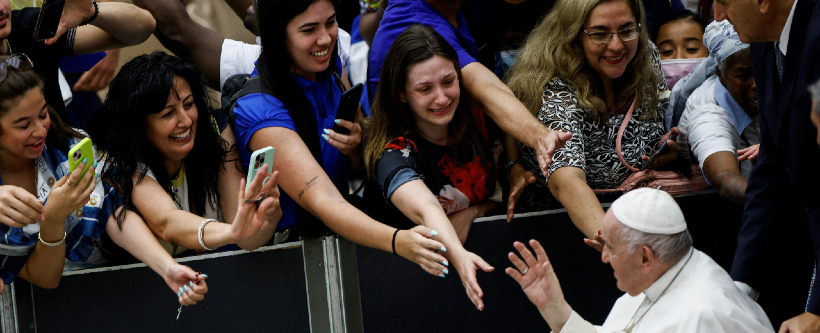
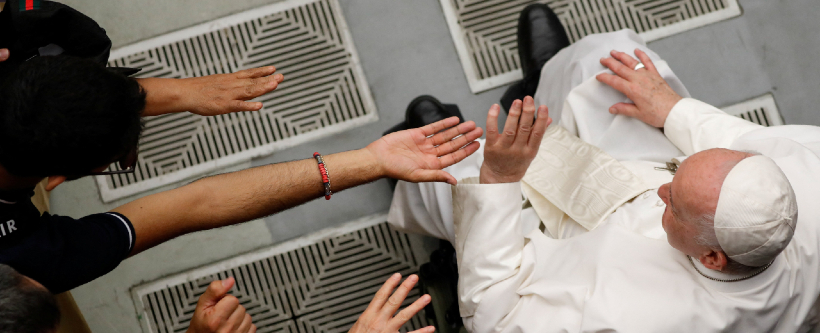
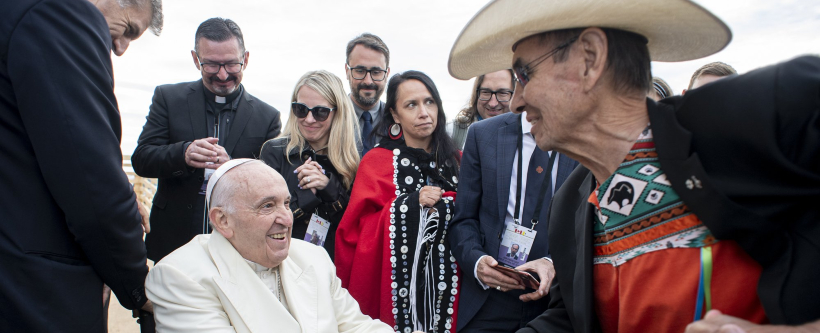
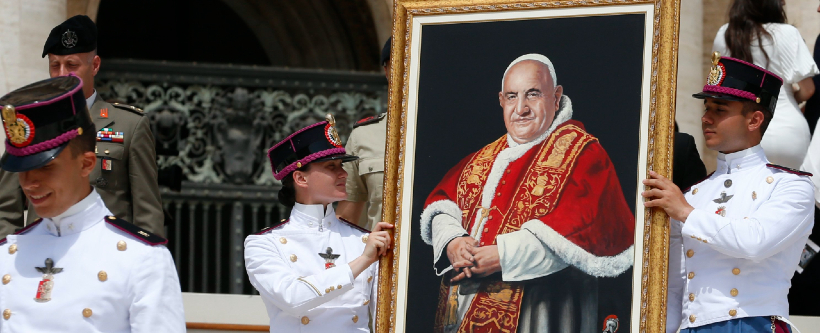
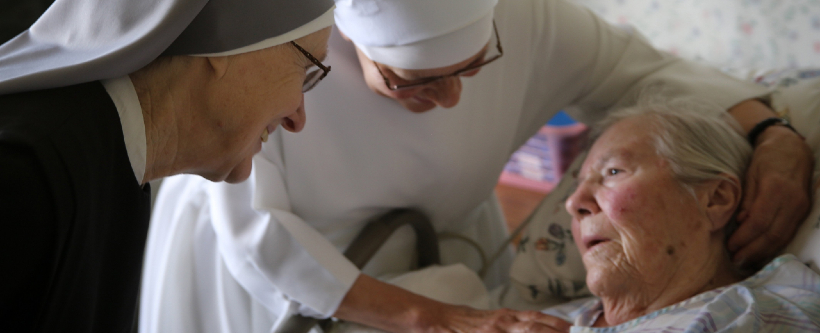
Facebook Comments